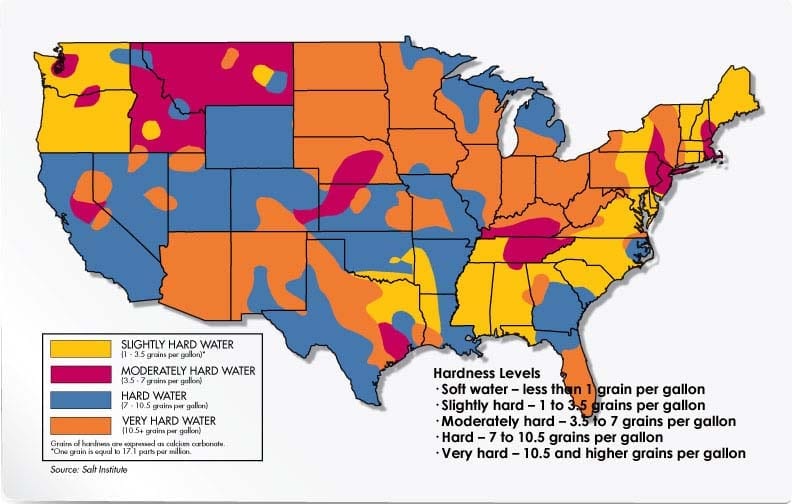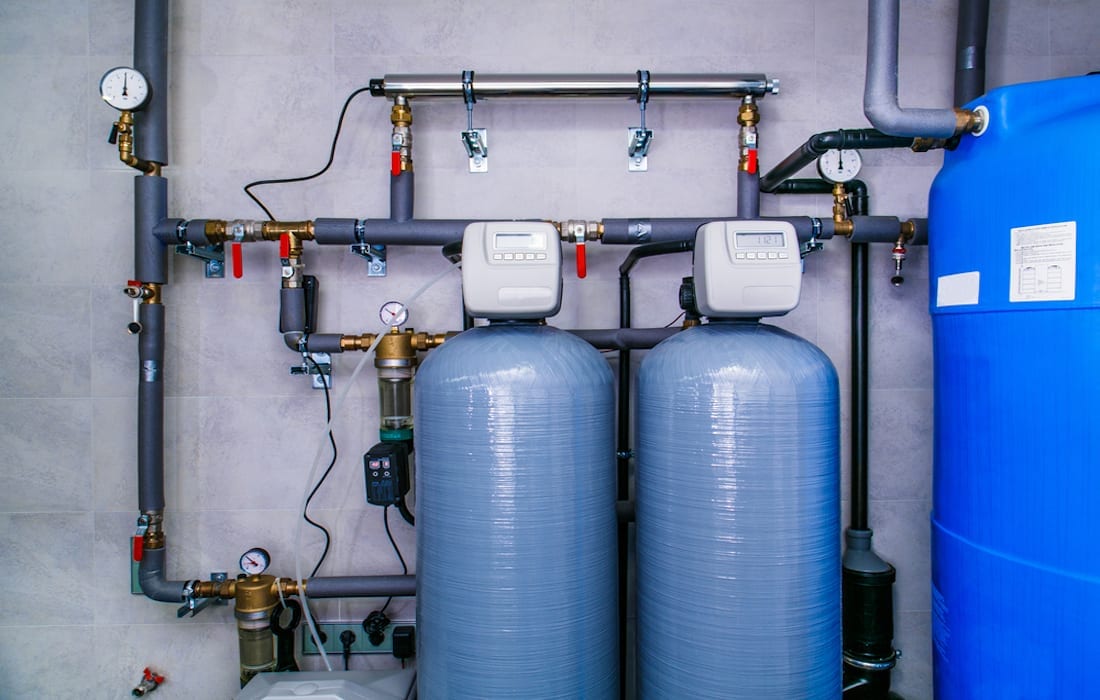Water hardness is a common occurrence in many cities and states, leaving homeowners to wonder what they can do to combat it. Fortunately, water softeners are a great solution for improving water quality in both homes and businesses.
What Are Water Softeners?
A water softener is a whole-home filtration system that removes calcium and magnesium minerals known for causing hard water. With these minerals removed from your water supply, you can benefit from better-tasting drinking water, healthier hair and skin, and less dishwashing due to the absence of mineral spots.
Your pipes and hot water appliances will also benefit from water softeners. Without the scale buildup in your pipes and water heater, they’ll work at their highest efficiency, extending their lifespan.

How Does Water Softening Work?
At the simplest level, traditional water softeners use salt brine to clean the minerals out of your water. The way this works is in the molecules of hard water. Calcium and magnesium are naturally positively charged ions, which allows these minerals to stick to pipes and other plumbing appliances.
When met with a negatively charged ion, like salt brine, the minerals stick to the negative salt brine ions, resulting in soft water flowing through your pipes. The minerals left behind attached to the salt brine go into a storage tank, which is a part of your water softener system.
That tank stores the salt brine, calcium, and other minerals, and then will flush them out when it is most convenient for you and your family. Most families elect for it to flush late at night while they are asleep. This cleansing process allows the water softener to continue working, resulting in little maintenance.
Why You Should Invest in a Water Softener
One of the main reasons homeowners consider a water softener for their home is because of hard water. When water flows through the city’s water supply, it gathers minerals like calcium and magnesium from large limestone deposits. The water then erodes the limestone deposits and dissolves these minerals into the water supply, creating what is considered hard water.
Calcium and magnesium deposits can remain in your drinking water and affect your home in different ways. While hard water doesn’t necessarily have any adverse side effects on your health—in fact, the National Research Council found that hard drinking water contributes to a tiny portion of your daily intake of calcium and magnesium—it can harm your hair and skin.
The minerals cling to your hair and body, causing dry skin and damaged hair. Hard water can even ruin your clothes when you wash them; it will make your clothes’ texture rougher and cause them to dull in color.
The Impact of Hard Water on Your Plumbing System
While hard water can be less than ideal for your body, it is most harmful to your plumbing system. Hard water leaves white or red stains on your shower, sinks, faucets, and anywhere else where consistent water is used. Cleaning supplies and soap can also become less effective. This is because soaps cannot dissolve completely, as the minerals themselves have already diluted the water.
The calcium and magnesium in hard water can build up in your pipes, reducing the water flow in your faucets and appliances. The mineral collections in your pipes can even create incredibly costly pinhole leaks.
Hard water reduces the lifespan of your plumbing appliances, like your dishwasher and washing machine. It does this by blocking the water flow to these appliances. The appliances must work harder to receive water, decreasing efficiency and lifespan.
This collection inside plumbing appliances is especially harmful to your water heater and exponentially reduces efficiency and lifespan. The hardness of the water decreases the average lifespan of a water heater from 20 to 25 years to 10 to 15 years or less.
Furthermore, hard water is more difficult to heat than pure water. Your water heater will have to use more energy to heat your water, which results in higher energy bills. Hard water can be extremely costly to you and your family, but a water softener can help alleviate these issues.
Do I Need Water Softening?
The hardness of water is determined by the milligrams of calcium carbonate per liter and is typically reported in parts per million (PPM). Generally, water with less than 60 PPM is considered soft, water with 60 to 120 PPM is moderately hard, and water with greater than 120 PPM is hard water.
If you’re noticing water spots on clean dishes and dull hair or dry skin, it might be time to consider a water softener for your home.
To learn more about water softeners in Kentucky, contact Fayette today or schedule an appointment online. We can help you decide on the perfect water softening system for your home.


 Skip to content
Skip to content

